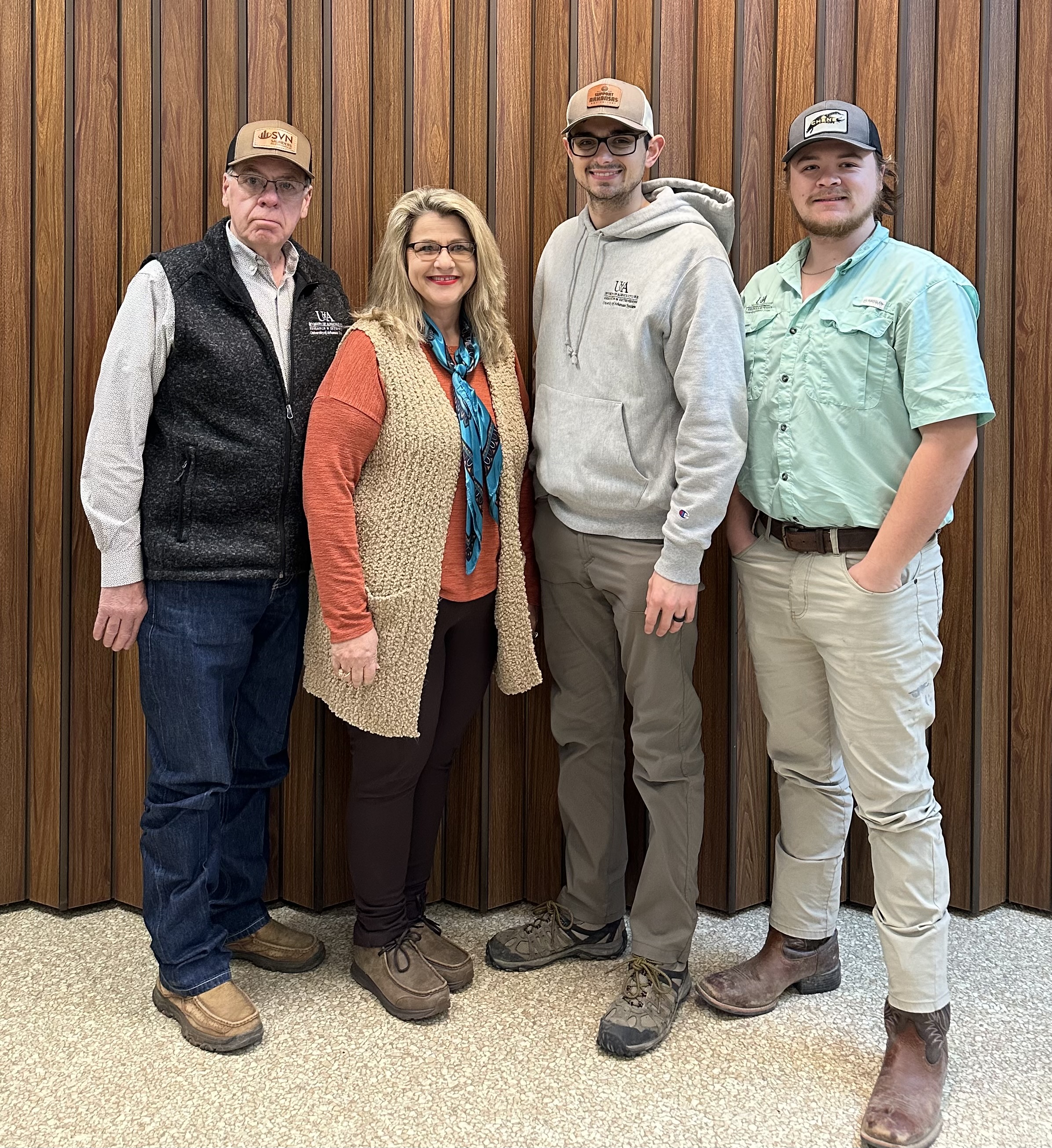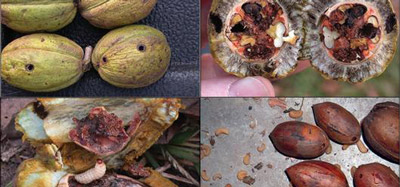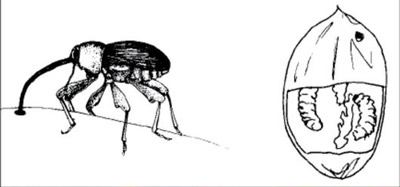Tri-County Pecan Production Program | Lonoke, Prairie, & White
Whether you have a pecan orchard or a few pecan trees in your yard, the Tri-County pecan production team is here to help! Get Arkansas-specific advice
and research-based information for optimal pecan production.
In this section:
Pecan Crop Load Management - How to Thin Pecans
Pecan Growth Stages
Pecan Nut Casebearer
Pecan Shuck Decline
Pecan Foliar Sampling
Herbicide Injury
Tips for Pollination
Late-Summer Pecan Scab Nut Drop
Pecan Scab & Hour Calculator
How We Use Telemetry Units to Measure Moisture
Collecting Data via SensorPush for Pecan Scab Application
Using Fungicides Properly
Improper use of fungicides can lead to development of fungicide resistance, which
can be defined as a loss of efficacy against a particular target pathogen. Failure
in efficacy is often first recognized when expectations of disease control in a particular
crop situation are not met even after the application of the labeled and recommended
dosage of fungicide. Loss of fungicide efficacy may gradually increase over time with
a slowly increasing loss of disease control, or it may appear suddenly with significant
loss of efficacy. The most common way that fungicide resistance develops is due to
the repeated and exclusive use of one active ingredient on a population of plant pathogens.
Download the fungicide resistance publication for more information.
Publication Resources
Frequently Asked Questions
Q. How many pecan trees can you plant on 1 acre?
A. In their native and eastern ranges, pecan trees are commonly spaced on a 40 feet
x 40 feet grid pattern, which is the equivalent of 27 trees per acre. After about
16.22 years, trees are thinned by half on a diagonal, thus leaving 14 trees per acre.
Q. How much is an acre of pecan trees worth?
A. Land is valued at $10,000 per acre and total investment in the orchard is fully paid
off in 15 years. All cost estimates assume an average nut production of 3,000 pounds
per acre, a $3.25 selling point, and an average 55 percent kernel, or $1.79/pound.
Q. What's the optimum soil pH range for pecan trees?
A. It's 6.0 to 6.5. A
soil test is the best way to know the pH of the soil and how much lime to apply, if needed.
Q. My small pecans and some leaves are falling off. What can I do?
A. Pecan nut and leaf drop in late summer is caused by water stress or injury by insects
and/or disease. Young nuts are very sensitive now and will abort at the onset of any
stress. Water slowly and deeply and control insects and disease with a spray program.
Q. Some of the large limbs in my pecan tree are drying and breaking off. This has
been occurring for several months - - even before they were weighted with a heavy
pecan load. What could cause this?
A. This is usually caused by shading out. Pecan limbs need to receive full sunlight
to prevent this problem. Usually this happens when trees are planted too close and
become crowded. The best solution is to remove some of the trees.
Q. The pecans are falling from my tree. Why?
A. There are numerous causes of premature pecan drop. Some varieties such as 'Desirable'
shed naturally. Poor pollination results in a drop from June through July. Planting
several varieties helps reduce the poor pollination drop problem. A small insect known
as the pecan nut casebearer is the cause of pecan shedding at three different periods
of the year; mid-May, July and on rare occasions in late August. This drop is easy
to identify because there is a small hole in the base of the pecan. Water stress can
also result in pecan drop. Ideally pecans should be watered every two weeks. Three
weeks without water is the maximum. Nutritional problems from shallow soil or poor
fertilization can cause pecans to shed throughout the year. Water stage in later July
and early August is the most common form of pecan drop. As the nuts move from size
development into kernel formation the pecan sheds very easily. Any stress received
by the tree at this stage can result in major fruit drop. Some trees can lose up to
one half of its crop if not properly managed during water stage. My guess is that
even though you have been watering your grass during hot, dry periods, you have not
deep watered your pecan trees. Watering grass is not enough for watering trees - slowly
soak the tree's root system at the dripline of the tree and not at the trunk.
Source: Aggie Horticulture
Q. Why will pecans become rancid?
A. High water content, High oil content, Low nutrition
Pecans are susceptible to becoming spoiled or rancid. When pecans are fresh and of
good quality, they are bright golden color but when they are stale and rancid, they
become dark brown. This spoilage happens because of the pecan’s high oil content.
Pecans should be stored in the freezer until ready to use. At room temperature, pecans
will keep for about 3 months. In the refrigerator, pecans will store for 6‐9 months,
and in deep freeze, pecans will store for many years with little decline in quality.
The oils in the pecan will absorb other flavors or smells from other items so storage
in airtight containers will help with the freshness.
Q. Why are there holes in my pecans?
A. That is the exit whole of a pecan weevil. The larva of this weevil can feed inside
the nut after the water stage. Then exits as the pecan falls and will over winter
in the ground under the tree, which will be your population for the following year
or two. We are on the front end of the time when they emerge from the ground. They
will emerge most of time after a rain.
Homeowners defense of these weevil are circle traps. Commercial growers have insecticide
options. Please refer to the
MP 144 for these insecticide options.
Still have questions? Contact us!
 Contact any member of the Tri-County Pecan Demonstration team:
Contact any member of the Tri-County Pecan Demonstration team:
Lonoke County - Kyle Sanders
Prairie County - Jacob Holloway
Prairie County - Josh Hambrick
White County - Sherri Sanders
or reach out to your local county extension agent.
Follow us for timely updates!
Facebook
Twitter @PecanTri
If you'd like to receive email updates, Contact Sherri Sanders at ssanders@uada.edu with your preferred email address.
Additional Resources


 Contact any member of the Tri-County Pecan Demonstration team:
Contact any member of the Tri-County Pecan Demonstration team: